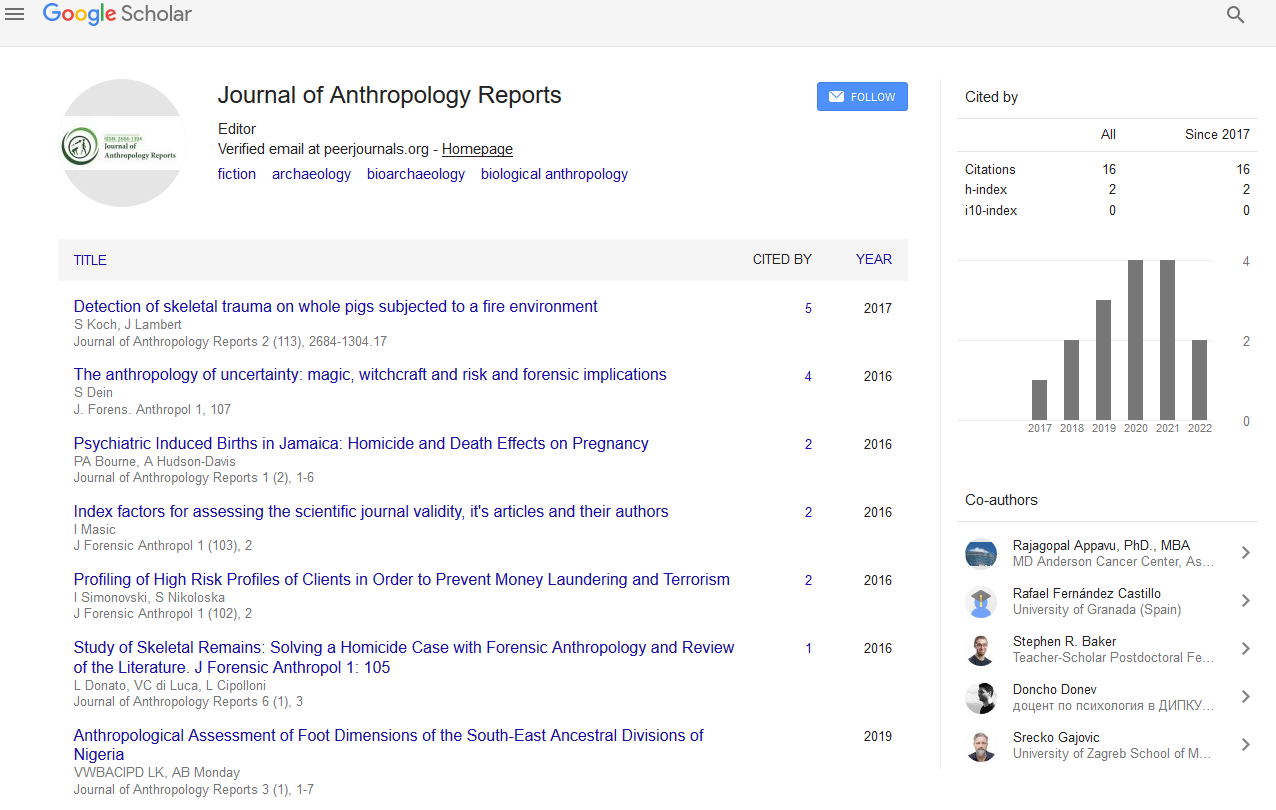Indexed In
- RefSeek
- Hamdard University
- EBSCO A-Z
Useful Links
Share This Page
Journal Flyer

Open Access Journals
- Agri and Aquaculture
- Biochemistry
- Bioinformatics & Systems Biology
- Business & Management
- Chemistry
- Clinical Sciences
- Engineering
- Food & Nutrition
- General Science
- Genetics & Molecular Biology
- Immunology & Microbiology
- Medical Sciences
- Neuroscience & Psychology
- Nursing & Health Care
- Pharmaceutical Sciences
Opinion Article - (2023) Volume 6, Issue 3
Advancing the Intricacies of Human Behavior through Anthropology
Moffa Miquel*Received: 04-Sep-2023, Manuscript No. JFA-23-23407; Editor assigned: 06-Sep-2023, Pre QC No. JFA-23-23407 (PQ); Reviewed: 20-Sep-2023, QC No. JFA-23-23407; Revised: 27-Sep-2023, Manuscript No. JFA-23-23407 (R); Published: 06-Oct-2023, DOI: 10.35248/2684-1304.23.6.169
Description
The complexities of human behavior arise from a multifaceted interplay of biology, culture, and individual experiences. To understand this intricate web, we turn to the field of anthropology, which offers invaluable insights into the why and how of human actions. By exploring the interplay between biology and culture, anthropology allows us to appreciate the diversity and universality of human behavior. This opinion article delves into an area of anthropological study of human behavior, illuminating its importance in comprehending our actions and interactions.
The intersection of biology and culture
One of the fundamental aspects of human behavior anthropology is its exploration of the intersection between biology and culture. Humans are unique in their capacity to adapt to diverse environments, and this adaptability is established in both our biology and culture. Biological factors, such as genetics and brain structure, play an essential role in shaping our human behavior. For example, studies have shown that certain genes are associated with personality traits, influencing individual behavior tendencies.
However, what sets humans apart is their ability to create and transmit culture. Culture encompasses a wide range of elements, including language, norms, values, and traditions. Anthropologists argue that culture acts as a filter through which biological impulses are expressed. This interaction between biology and culture is evident in various aspects of human behavior.
Language is a prime example of this interplay. Humans are biologically eager to language acquisition, thanks to their unique brain structures. However, the specific language spoken by an individual is determined by their cultural environment. Language not only functions as a method of communication but also changes our perception of the world. The cultural nuances embedded in language influence our thoughts, emotions, and behaviors.
Cultural norms and socialization
Another critical aspect of human behavior anthropology is the study of cultural norms and socialization. Every society has its own set of norms and values that govern acceptable behavior. These norms are learned through a process known as socialization, which occurs from infancy through adulthood. Family, peers, and institutions like schools and religious organizations all contribute to this process.
For instance, the concept of personal space varies greatly across cultures. In some societies, people maintain close physical proximity during conversations, while in others, maintaining a certain distance is the norm. These cultural norms are internalized from a young age and become ingrained in individuals' behavior.
Socialization also plays a role in shaping gender roles and expectations. Anthropologists have observed how different cultures have distinct notions of what it means to be a man or a woman. These gender roles influence how individuals are expected to behave, what jobs they can hold, and even their rights within society.
Cultural relativism and ethnocentrism
Anthropology also introduces the concepts of cultural relativism and ethnocentrism, which are essential in understanding and appreciating human behavior. Cultural relativism is the idea that all cultures are equally valid and should be understood within their own context. It challenges the notion that one culture is superior to another.
In contrast, ethnocentrism involves judging other cultures based on the standards of one's own culture. This can lead to misunderstandings and biases when analyzing human behavior in diverse societies. Anthropologists emphasize the importance of adopting a culturally to avoid or unfairly evaluating the behavior of people from different backgrounds.
The influence of globalization
In our rapidly globalizing world, human behavior anthropology also grapples with the impact of cultural exchange and globalization. As cultures come into contact through trade, migration, and communication, they often influence one another. This can lead to shifts in cultural norms and behaviors.
For example, the spread of Western media has led to changes in fashion, beauty standards, and consumer behavior in many parts of the world. Similarly, the migration of people from different cultural backgrounds can result in the blending of traditions and the emergence of new hybrid cultures.
Conclusion
Human behavior anthropology is an interesting field that delves into the intricacies of why we behave the way we do. By examining the interplay between biology and culture, exploring the role of cultural norms and socialization, and embracing cultural relativism, anthropology provides valuable insights into the diversity and universality of human behavior. As our world continues to evolve and cultures intermingle, the study of human behavior anthropology becomes more relevant than ever in helping us navigate the complexities of our globalized society.
Citation: Miquel M (2023) Advancing the Intricacies of Human Behavior through Anthropology. J Anthropol Rep. 6:169.
Copyright: © 2023 Miquel M. This is an open-access article distributed under the terms of the Creative Commons Attribution License, which permits unrestricted use, distribution, and reproduction in any medium, provided the original author and source are credited.

